Tanzania 2016
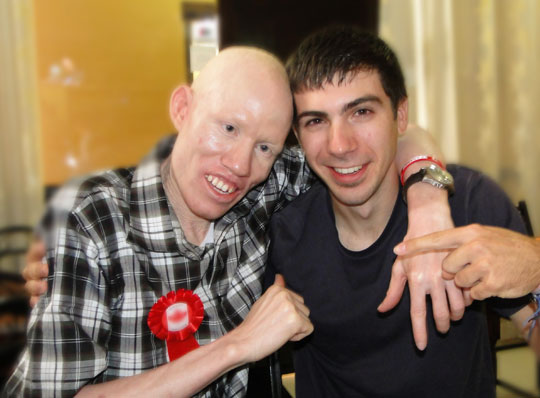 We
are suffering from our long gruelling flight on our journey into
Africa. Matt’s fiancée, Hayley, Mom and sister said goodbye at
Toronto Pearson. As we were jostled through security screening, I
left my laptop in my backpack for inspection. So I was ushered back
through the whole process. This time all went well. I quickly
grabbed my stuff and hustled on. Five minutes passed when I realized
I was about to lose my pants: “My belt,” I mused, "my wallet and
phone!" I returned a third time and everything was sitting in the
open, waiting for anyone to pick them up.
We
are suffering from our long gruelling flight on our journey into
Africa. Matt’s fiancée, Hayley, Mom and sister said goodbye at
Toronto Pearson. As we were jostled through security screening, I
left my laptop in my backpack for inspection. So I was ushered back
through the whole process. This time all went well. I quickly
grabbed my stuff and hustled on. Five minutes passed when I realized
I was about to lose my pants: “My belt,” I mused, "my wallet and
phone!" I returned a third time and everything was sitting in the
open, waiting for anyone to pick them up.
Our Boeing 747, KLM 692 seat configuration
feels like stretchy Levis and making any move greater than a yawn is
sure to bother someone behind, ahead or beside us. We arrive in
Amsterdam after six long hours. While we were going through
Amsterdam Airport Schiphol security, Matt’s shaving cream was
confiscated; it was 50 ml over size. Right now we are somewhere over
Egyptian airspace, cruising at 950 kilometres with the pyramids
10,000 metres below. It has been 28 hours since any distant memory
of sleep. We crash into a bargain hotel, steps away from the airport
in Dar es Salaam.
Ring, ring! The phone, inches from my ear,
jangled at 6:00 a.m. I think we were just starting to doze. It was
Mahona, waiting for us at the hotel lobby, an hour early. His
greeting was sincere and bone crushing, as he lifted both of us off
the ground.
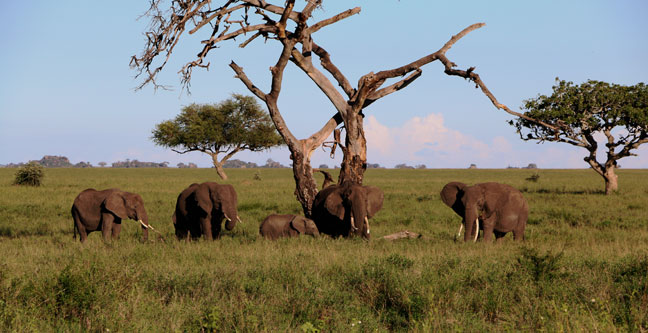
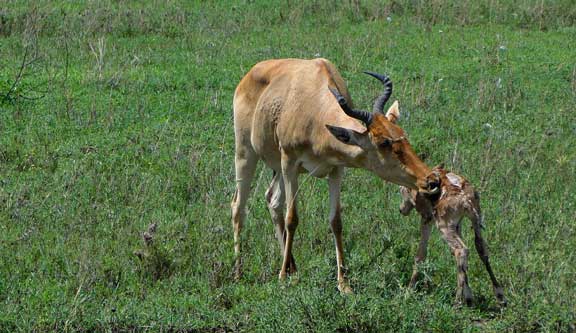
Hanneke organized a visit to the Serengeti to
introduce Matt to Tanzania’s amazing animal heritage. Last night we woke
at 2:00 a.m. when an elephant tried to get into the fenced kitchen
enclosure of our campsite. Our cook finally persuaded him to pack his
trunk and return to grazing by manoeuvring him with the lights of our
safari van. Now we're just finishing our second day in the park. We will
spend tonight in the Ngorongoro Wildlife Lodge, strategically perched on
the rim of a crater 600 metres deep with the world's densest collection
of wildlife sprawled below our window. These are amazing days with the
lions, wildebeest, flamingos, gazelles, giraffes, monkeys, ostriches,
zebras and a newborn hartebeest.
A lazy morning
It’s Sunday morning. A lazy, hazy sun bathes
the Ngoro Crater. From our perch, everything looks so peaceful, so
amazingly perfect. However, below, we remain oblivious to the intrigue
and danger that await the playful young wildebeest or gazelle. While we
head for our toast and cereal, some animals below will become the day’s
breakfast for a predator. So serene, so comforting—but in this fallen
world, we're so far from the reality obscured below.
The Serengeti
plains are vibrant green from the torrential rains. We met up with lions
almost close enough to lick our noses. We had to move our Land Cruiser
out of the way of the rushing herd of elephants or they would have
forced us away without altering their stride—the way they knock over
trees that happen to grow in their path.
We left Mwanza early in the morning to pick up
Mfaume at his school. He has finished school. His marks are good, but he
will have to wait three months for his final results to know where he
can apply next.
The drive to Tabora took about six hours, where we were warmly
greeted by Naomi, Hanneke’s friend and homemaker.
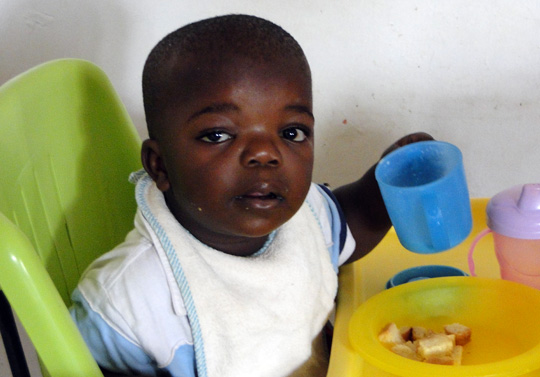 The
project site is ready but today the roads are too muddy to get out
there, so it is a great time to shed our jet lag and chat.
The
project site is ready but today the roads are too muddy to get out
there, so it is a great time to shed our jet lag and chat.
Last night I enjoyed a wonderful rest, but woke
early this morning, riddled with mosquito wounds! Sure hope I don’t
over-stress any effectiveness of my medications. Not sure where the
little critters got in as our net is brand new.
Torrential downpours have transformed mud roads
into slithery ruts, some barely passable. Still, sodden oxcart drivers
and bikers, burdened with charcoal and a myriad of goods, slither along
without pausing.
Yesterday we stood beside a critically ill man
at the government hospital. The ward was sweaty hot and the air felt
thick with the stench of death. His eyes were open but we were unsure
how much he saw. He responded with a weak smile through his parched lips
when I touched his sun-blackened hand—skin barely camouflaging bones.
Hopefully he will improve but his diagnosis is complicated. Hanneke
prayed with him.
A poor family welcomed us into their humble
home. We brought food from the church. The small children dragged out
their few dirty pages of school books—smudged and ragged. These children
remain far behind in their work and the oldest teenage son is unable to
control his bladder. These are hard times.
Hanneke’s nine children fare much better but
not without the usual family challenges. Yesterday Mahona's ears were
painful and he could not hear in class. He relocated to the front, but
he uses binoculars to see the board and then he was too close.
We visited the building project site yesterday
and it looked amazing. A huge tract of land was purchased at a very
reasonable price. When completed, it should soon serve the needs of many
people who otherwise would have to walk up to eight hours for help. Soon
we will begin our serious construction work under the baking sun.
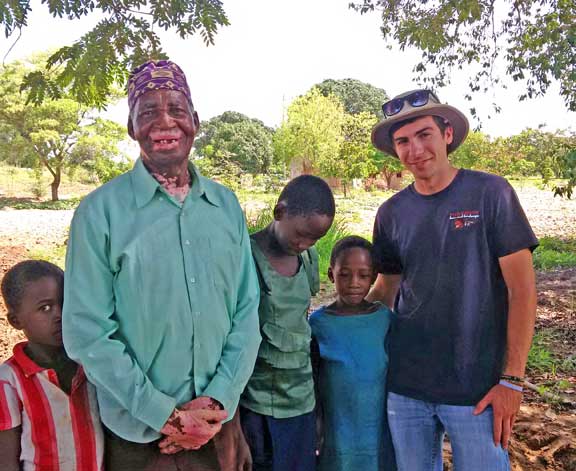 The
bishop and the president
The
bishop and the president
At the office this morning, the bishop of the
Africa Inland Church of Tanzania greeted us. He supports Hanneke and her
work. He's a passionate spiritual leader, yet a very humble man. He was
in Dodoma the previous week at a meeting with the churches serving with
compassion. (Over 200 orphaned and needy kids are fed, taught and cared
for by Hanneke’s church in Tabora. It is a Christian group that cares
for orphans and undernourished children in cooperation with local
churches). Tanzania’s new president, John Magufuli, attended the
meeting. He wanted to meet with this group that was helping the people
in his country. They shook hands and sat together in a circle of leaders
from several organizations. When the meeting was over, his bodyguards
escorted him away from the building. It's a major statement for the
bishop to mention the humility of the president. The bishop asked us to
pray for this man, that being elevated to power as the leader of the
Republic of Tanzania, does not change him and that he will be able to
carry out many of the new visions he has for the people of this
wonderful country. He has already made many bold steps to route out
corruption and waste.
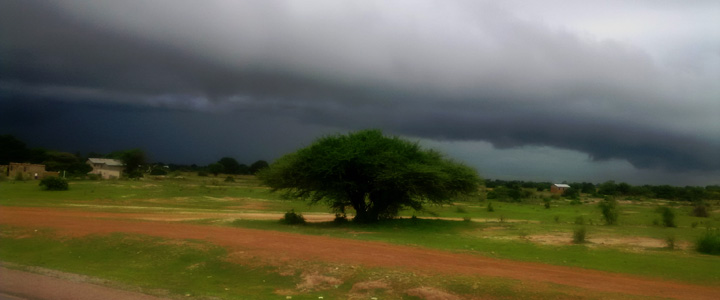
Those African Rains
A heavy, soiled blanket of blue advances across
the sky. Crackling lightning and deep-throated thunder shake the earth.
The rain pounds violently, creating instant rivers and lakes. The lush
mango branches twist cooperatively in the bruising winds. Then as
suddenly as it began, a beautiful, freshly laundered blue sky replaces
the torrents and the sandy red soil drinks her refreshing abundance.
This rainy season has blessed the fertile land. Now the rice, maize,
beans and cassava plants can thrive to feed the nation. Ongoing rains
are a necessary blessing from God.
Driving
Yesterday we drove to meet Ngassa in Mwanza—a
two-day high adventure. Many roads are paved. And that is good but also
dangerous. Paving is poor, rather like making lasagna—a layer of crushed
stone followed by a thin layer of tar, then another layer of gravel,
etc., packed by rubber-tired vehicles before being baked by the sun.
Monstrous trucks pummel the fragile surface. Overloaded donkey carts
meander along the shoulder and part of the road. Bicycles carrying
passengers, chickens and rolled steel vie to use the pavement until a
vehicle honks. A steady stream of pedestrians of all ages is everywhere,
as the traffic roars by at 100 kilometres per hour. Washouts are marked
by tree branches and redundant speed bumps appear like mirages. We
passed a fatal accident, caused when a vehicle passed on a blind curve
and hit a woman walking along the side of the road. We paused to be sure
help was on the way and then proceeded in prayerful silence. Someone’s
mother and wife will not return home tonight carrying cassava roots on
her head. Roundabouts produce their own challenges! You are never sure
that the other road-user has any inkling of obeying the suggestions of
the road. The vehicular choreographed staccato minuet is orchestrated by
the honks and roars of the traffic.
Later we visited several sick folk in the rural
area of Manoleo. Despite their obvious discomfort, they encouraged us.
One 85-year-old gentleman was tilling his field with his three children,
aged 13, 11 and 8. He is a wise, well-educated teacher who never took
time to get married until he was 72. He has the vigour and enthusiasm of
someone half his age. He is so grateful to Hanneke for the help of her
friend, a German doctor, who operated on him and saved his life.
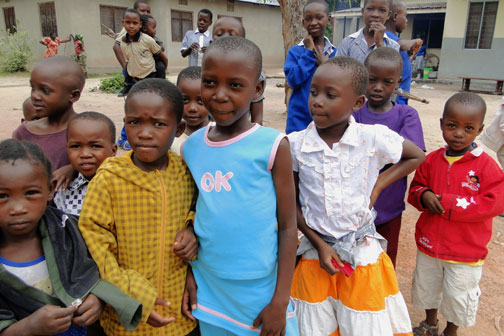
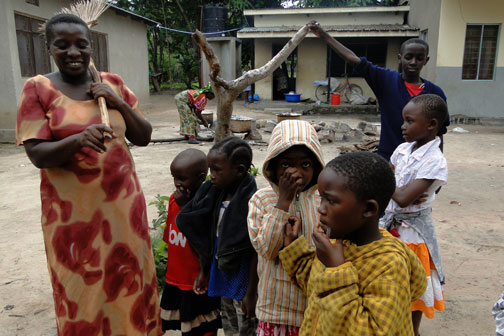
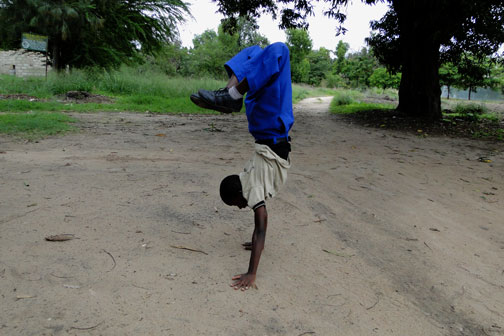
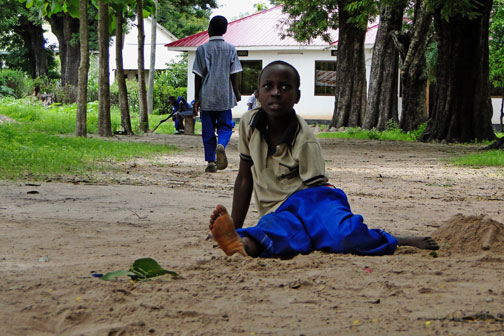
Over 200 orphaned and needy kids are fed, taught
and cared for by the church under Compassion.
Malumba Clinic
Construction
The trench for
the security wall of the new medical centre has been partially dug but
all work has come to a standstill. Our next step is to deepen the
trenches and then drag very large, heavy boulders for the foundation.
Rains and negotiating the cost of labour have crippled any progress—but
then there is always Mañana. After all, THIS IS AFRICA!
The church
service
We pulled up to the simple concrete block
church at 9:45 a.m., just a few minutes late. The sun glared off the
newly installed glass windows. The sound of the choir hammered the air
and caused the glass to vibrate.
Inside, there were over 400 bodies of every age
and size crammed ample hip to ample hip in the wooden pews.
Several churches in the Tabora area have joined
together to celebrate Women’s Day. Each congregation came with at least
one choir. Choir members left their seats and headed to the front,
singing as they swayed. The singers' swinging bodies transferred energy
throughout the congregation. Women ululated, men whistled and many
danced to the beat, joining the choir at the front.
The merciless high-noon sun beating down on the
corrugated steel roof, plus the near- frenzied singing, clapping and hip
swinging raised the temperature to about 40 °C. Bothersome flies were
enjoying the collection of sweaty worshippers. Few paid the flies any
heed, other than occasionally shooing a fly from a youngster’s eye. The
dark, wide-eyed babies held in their mothers' arms and occasionally
nursed, took in everything, especially the pale faces of us visitors.
Heat caused trickles of sweat on the beautiful black skin of the women
crammed in front of us. Flies feasted on all of us with no prejudice.
Sincere prayers punctuated the singing for the
sick, the prisoners and Tanzania's new president. A video located beside
the platform introduced the choirs.
After two and a half hours of intense music, it
was time for the offering. We waltzed to the front to drop our shillings
into wooden boxes. Then it was time for the preaching, followed by other
choirs.
A gentle breeze filled our lungs as we
exited—the singing and worship still coursing through our ears some four
short hours after we had arrived.
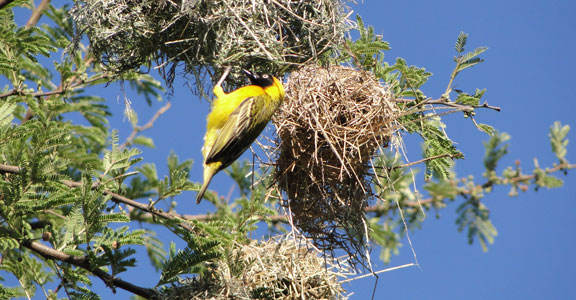
The Weaver birds hang upside down while they
weave their intricate nests, singing beautifully all the time.

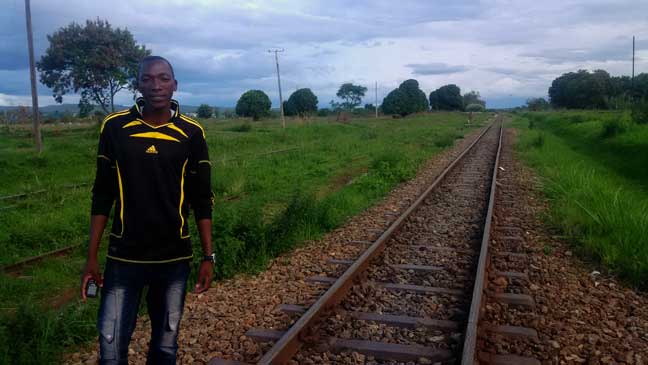 Today
is a bit less hectic. No trench digging or massive boulder moving. More
relaxing time, even time to catch up on overdue devotions and some reading.
Today
is a bit less hectic. No trench digging or massive boulder moving. More
relaxing time, even time to catch up on overdue devotions and some reading.
Hanneke and Matt bounced off after lunch,
heading upcountry—a four-hour challenge-ridden journey to pick up Jackie
(14), Kiri (13) and Faraja (8), from Rocken Hill Academy. Rocken Hill
inherits its name from its rock-strewn surroundings. It is renowned in
East Africa for its excellent education and life skills. They should
arrive home later tomorrow. Then Hanneke’s home will have five full time
kids plus Matt and me. On the 23rd, Mahona should arrive from Dar on the
bus—a fifteen-hour journey. That just leaves a couple more to show up
closer to Christmas.
 The
huge 3,000-litre rain-water tank needed to be cleaned. It is a bit of an
awkward brute with any water inside. Four of us manhandled it until it had
enough tilt to drain. Every drop of water was caught in a bucket or tub.
Although this has been an abundant rainy season so far—raining almost
daily—one can never waste a drop of this life-sustaining liquid. Finally the
stream from the tap became a trickle. Then we wrestled the big hulk to the
ground and onto its side. Mfaume squeezed himself inside through the round
opening in the top, bidding us JAMBO (Welcome inside). For the next thirty
minutes, he sweltered in the heat with the sun beating down on the black
tank, until it was perfectly clean to his exacting standards. When he
re-emerged, he hurried into the house to peel off his clothes and take a
cold shower.
The
huge 3,000-litre rain-water tank needed to be cleaned. It is a bit of an
awkward brute with any water inside. Four of us manhandled it until it had
enough tilt to drain. Every drop of water was caught in a bucket or tub.
Although this has been an abundant rainy season so far—raining almost
daily—one can never waste a drop of this life-sustaining liquid. Finally the
stream from the tap became a trickle. Then we wrestled the big hulk to the
ground and onto its side. Mfaume squeezed himself inside through the round
opening in the top, bidding us JAMBO (Welcome inside). For the next thirty
minutes, he sweltered in the heat with the sun beating down on the black
tank, until it was perfectly clean to his exacting standards. When he
re-emerged, he hurried into the house to peel off his clothes and take a
cold shower.
Mid-afternoon, Mfaume and I walked around his
community. We strolled, often hand-in-hand (so common here), and he
pointed to a house where he had once lived—where he could count the
stars at night through the roof over his bed. We stopped often to just
sit and chat with his friends. He took me into a home of an ex-army
friend. This is where he often comes to watch soccer because they have
cable TV. His friend recently suffered a stroke and we found him flat on
his back on the cool tile floor. Clothed only in a loincloth, he
squirmed closer to shake my hand. His wife and young daughter smiled
weakly as they looked on. He is slowly regaining mobility. Their home is
pleasant and modestly decorated. We were assured of a warm welcome when
we returned. As we meandered home, several young kids wanted to hold my
hands and hear a few words in English. Many would fire off: “Hello, how
are you? I am fine thank you," before you could even respond. Maybe they
would count to ten for me. Swahili is the national language but English
is taught in schools—depending on the quality of the school and the
teacher's commitment. Mfaume's school teaches all classes in English
except for his Swahili class. He's hoping to be approved for higher
education and possibly become a doctor—a common dream—to help his
people. He has a loving, servant attitude.
Naomi, Hanneke’s homemaker, will spend the
night here. She cooked rice, beans, spinach and strips of beef, which we
polished off with sodas.
A small electric fan in Hanneke's guest room
masks the myriad of sounds of the African night: the train with its
extended forlorn horn and clattering rails (the tracks are only half a
kilometre from Hanneke’s home); the rooster with his faulty time-keeping
mechanism; and the dog chorus that can start with the smallest yelp and
carry on for an extended time. Several church choirs frequently practise
late into the night or a wedding celebration might have no end. The
amplifier is the modern curse on the peace of Tabora. Other night sounds
jar you awake and then cause you to toss and turn wondering about the
source. But our fan, that dear little gently purring air-moving gem, is
our good rafiki (friend) during the nights when we have electricity.
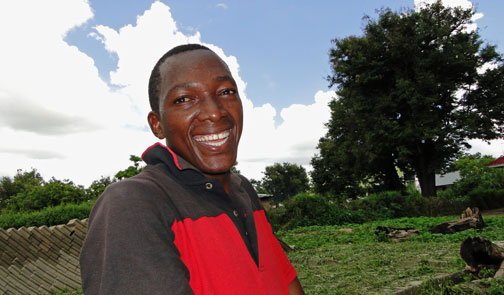
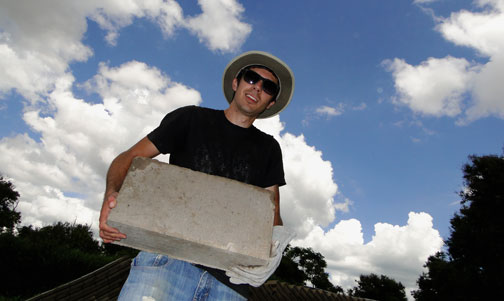
Construction progress
As we left Hanneke’s driveway, the crazy
chicken was again pacing in front of her safe, spacious sheltered
hennery that she shared with a dozen fellow bird-brained friends. Their
free-range eggs taste great, with yolks the colour of a setting African
sun. The crazy chicken pecks at the others until they gang up and chase
her through her small escape hatch. Outside she struts triumphantly back
and forth in a 1.5 metre circuit. She glares sideways at her penned
colleagues—clucking about her freedom—her freedom to march in her
self-imposed circuit.
It’s a twenty-minute drive through Tabora, over
countless, redundant speed bumps and then past the Irish-operated
orphanage to the Manoleo clinic. At Manoleo, Dr. Thomas counsels and
treats a variety of health concerns: aids, malnutrition, snake bites,
machete cuts, numbness, blood pressure, typhoid, etc. Today the busy
clinical staff is stitching a young boy. He suffered a blow to the head
from a heavy, sharp hoe. He pleaded for them to stop but that was not an
option. He needed twenty stitches and an examination. Each puncture of
the stitching needle was followed by heart-wrenching screams from the
child. No one uses pain killers here and his essential treatment is more
than the other waiting patients can expect.
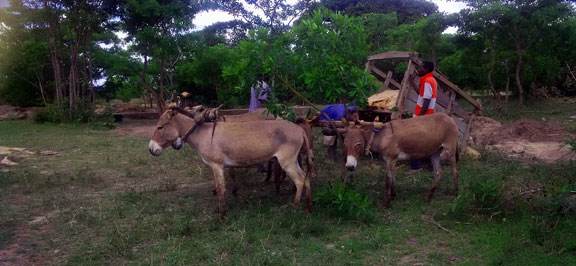 The
security wall at the new Malumba health, education and evangelism centre
will enclose 20 x 25 metres. The main building, in the western end of
the enclosure will be 5 x 10 metres with two rooms and a covered
verandah which will serve as a classroom and waiting area. Two bathrooms
will be built at the opposite end of the enclosure. Moringa trees will
be planted inside the walls. Moringa is recognized for its health
benefits: from the dried leaves to the seeds contained in longish bean
pods dangling from their branches.
The
security wall at the new Malumba health, education and evangelism centre
will enclose 20 x 25 metres. The main building, in the western end of
the enclosure will be 5 x 10 metres with two rooms and a covered
verandah which will serve as a classroom and waiting area. Two bathrooms
will be built at the opposite end of the enclosure. Moringa trees will
be planted inside the walls. Moringa is recognized for its health
benefits: from the dried leaves to the seeds contained in longish bean
pods dangling from their branches.
Our workers arrive at the site on bicycles or
on foot—many barefoot, others wearing sandals.
The donkey cart clatters up, weighted down by
huge boulders and sand for the foundation. Four donkeys are yoked
together, two by two. The driver’s wooden cart is old and heavy, even
without the boulders. The driver rides in the cart as well and reminds
the donkeys of his dominance with his all-too-frequent stinging whips.
Water arrives by bicycle from a spring more
than two kilometres away. Four three-gallon yellow plastic containers
are balanced on the bike. Each cost 200 Tanzanian shillings (80 cents)
delivered. The bike has only one speed and dubious brakes.
 A
Mediterranean blue sky with pristine white clouds and the sweltering sun
beat down on the plot of land. The trenches have been prepared. So let
the construction begin! Some sparse clouds offer fleeting relief.
A
Mediterranean blue sky with pristine white clouds and the sweltering sun
beat down on the plot of land. The trenches have been prepared. So let
the construction begin! Some sparse clouds offer fleeting relief.
We brought water bottles and a couple of
sandwiches which we store in the shade of a small tree (our onsite
fridge). The local workers drink water from a huge bucket, which looks
milky brown but is wet. They must have some inherited immunity to the
variety of critters that the liquid must harbour.
Fifty-kilogram
bags of concrete, completely dusty and grimy, arrive from Tabora on a
three-wheeled motorcycle-lorry combination. We push the overloaded
bajaji up the final slope. Young men carry the cement bags effortlessly
on their shoulders.
The large boulders are manhandled into the
trench and then smaller ones fitted into the gaps. We mix the concrete
with shovels, turning the sand and concrete mixture over and over before
gradually adding the water. Buckets of mixed concrete are carried to the
fundi (head mason) who organizes everything with a trowel, guided by
tightly stretched strings. Concrete is interspersed with the stones.
Work continues steadily and the finished surface is remarkably smooth.
Nearing the end of the building project, there
will be a need for a system to collect rain water for the clinic.
Although our work day was not long, we arrived
home, tired and very dirty. The familiar clucking of the crazy chicken
welcomed us as she gave us her sideways smirk.
A different day
Well the rains, impassable roads and the
funeral for a nephew of our supervisor have stalled progress on the
site. We chose to adapt to this culture of the people we have grown to
love more and more day by day. Outside, Hanneke’s guard is busy hacking
the lawn with a machete, often hitting stones, Dressed in a blue jacket,
light green pants and bright green boots, he blends gradually into the
lawn. So with no progress to report, I’ll just recount a few thoughts of
urban Tabora.
The electricity has been off for over thirty
hours. The temperature in our room is escalating in sync with the
humidity. My feet have dragged enough sand into my bed to give me dermal
abrasion. After crawling into my bunk, I quickly realize that I am far
from being alone. Mosquitoes hover like buzzards. These tiny demons with
their potentially lethal cargo are so small that you don’t feel them
land until it's too late. Sweltering and swatting in total darkness
accomplishes nothing. I discovered near morning, that the mosquito net
was snagged on the ladder and draped open as a warm welcome to my
enemies.
The neighbours have two hound dogs. Although I
have yet to see a moon here, they must sense one. One begins to yowl and
then is joined by his colleague—that mournful eerie wailing of
desertion. Many other, far less melodious canine creatures join the
chorus with superior volume. This continues for five minutes, then after
a brief intermission, begins again with renewed vigour.
Tabora’s downtown market is a jumble of shops
and stalls. The stench of dagaa penetrates every nose first. Dagaa is a
small sardine-like fish from Lake Victoria where they are sun dried and
shipped throughout Tanzania. They are a very good source of protein and
omega-3. I wonder how there can be any space for water in the lake with
the quantities of dagaa that exist. Huge stacks dominate most food
stalls. When they are dried and transported, their tiny scales become
airborne dust that coats the lining of the nose.
Then there are the meat mongers. Carcasses hang
in their open shops, festering with flies. Hunks are hacked off and
plopped onto a balance-scale and it quickly becomes impossible to
identify the animal sacrificed. Chickens squawk to avoid being chosen
for some mama’s family dinner. Non-continuous tarps droop between the
stalls to keep out some sun and some rain. In pleasant contrast, fruits
and vegetables offer a beautiful tapestry of colour and fragrances.
Competing merchants share tables or stalls. Sputtering generators mix
their fumes into the overall ambiance. Shoppers jostle through the maze
of maize and rice. Merchants grab your arm to encourage you to visit
their shop. Clothing shops are interspersed throughout the market. They
are usually deep and narrow with little light. Shoes and clothing
hanging from the ceiling make them feel like a bat cave. We squeeze, all
eight of us, into an area snug for one person half our size. Ten shops
later and we have two fine dresses and two handsome shirts for the kids’
Christmas. Wriggling our retreat through bikes, carts, rows of parked
pikipikis (motorcycles), bike taxis and boys carrying loaded soda cases,
we breathe fresh air again, still clutching our purchases. We arrive
home as exhausted as we would have been after a heavy day’s labour—just
three hours later.
Nostalgia
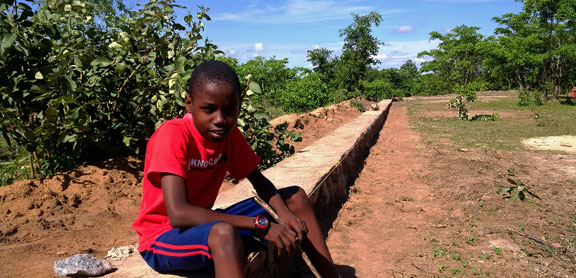 Today,
it started raining with the rooster’s crowing. Now it is noon and the
heavy clouds are beginning to meander off. African rains pound in
torrents, then lessen to a heavy downpour—so wonderful for the crops.
Usually they last about twenty minutes, but today was an exception. We
celebrate a rain day with Hanneke and the kids—doing laundry, emails,
shopping and helping the kids prepare school supplies for boarding
school.
Today,
it started raining with the rooster’s crowing. Now it is noon and the
heavy clouds are beginning to meander off. African rains pound in
torrents, then lessen to a heavy downpour—so wonderful for the crops.
Usually they last about twenty minutes, but today was an exception. We
celebrate a rain day with Hanneke and the kids—doing laundry, emails,
shopping and helping the kids prepare school supplies for boarding
school.
Inside one of Tabora’s three prison compounds,
the army has opened a store—operated like a mini warehouse. They import
an array of merchandise: fruit juices from Egypt; canned goods from
Europe; cereals from Dar es Salaam; small and large appliances from
China; mattresses from Kenya; furniture from China; soap; snacks and
electronics from Korea and Vietnam. When shipments sell out though, you
can never be sure of a re-supply. There are several security checks on
every purchase. There are no credit cards and likely no change in the
till, so shoppers have to pick out some item equivalent to their change.
Many items are not available anywhere else in Tabora and prices are
lower than elsewhere so the store is popular even with the street
vendors.
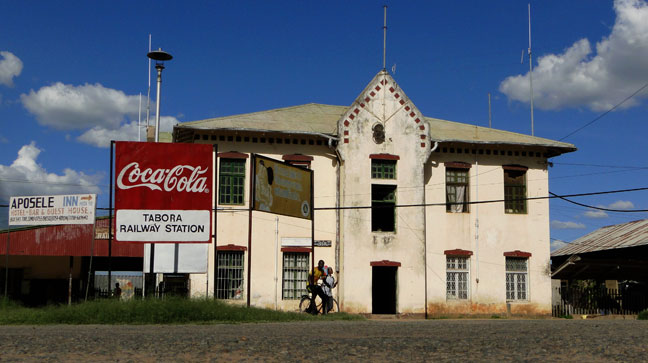 At
the Malumba site, we await the donkey cart with more big boulders to
complete the foundation for the wall. We purchased more concrete which
needs to be stored in a secure location or it might just get borrowed.
The bags were moved on bicycles.
At
the Malumba site, we await the donkey cart with more big boulders to
complete the foundation for the wall. We purchased more concrete which
needs to be stored in a secure location or it might just get borrowed.
The bags were moved on bicycles.
On our return from the site we passed a young
mother walking with her infant daughter, struggling through the noon-day
heat on her way to the Manoleo clinic. Her child, strapped to her back,
had diarrhea and a fever and was already showing signs of
dehydration—all familiar symptoms of malaria. The unfortunate down side
of this great rainy season means increased mosquitoes and, consequently,
malaria. The young mother had been walking for over one hour and faced
another two hours to the dispensary. Hanneke offered her a ride in our
van. The tiny mama was not familiar with riding in such a vehicle and
with the first lurch in the road, she was tossed into the air and came
to rest next to me, with her hand clutching my leg. She was mortified
when she looked—but when I laughed, she laughed too and the little baby
showed her two bottom teeth in a giggle. We dropped them off at the
clinic to get her sweet daughter the much- needed help.
Back home, two
bicycles needed repair. Neither had brakes and both had flat tires. Matt
and I wrestled them the two kilometres into town. Squatting along the
road with a metal tool box, a fundi (bike repair expert) offered his
service. He knew how to fix bikes with a minimum overhead. After over an
hour of work and chatting, he had replaced the brake cables, put three
patches on one tire and supplied new brake pads. He adjusted and oiled
the chains and finished by wiping every inch of the bike frames clean.
The cost was $3. He wished us karibu
as we rode our remanufactured bikes onto the sandy road.
We heard sounds at the Tabora railway station
so we rode by to check out the local commotion. It was just another day
at the station. One hundred or so people milled around and a freight
engine shunted box cars, belching sooty black smoke. One woman purchased
a ticket, which took about ten minutes. We searched for a passenger
schedule but to no avail. We would like to take the train when we leave
Tabora, but lack of reliability would likely mean missing our flight.
Inside the waiting area, thunder cracked out of the blackening sky and
we jumped as the noise shook the metal roof. Many standing outside raced
for cover as rain cascaded. Numerous gaps in the roof meant you had to
choose your spot wisely. As we waited out the storm, the station
manager, in a spotless white shirt and tie, came to chat. He had been in
Toronto and loved the underground train system there. He was proud of
the improvements in the Tanzanian rail system, despite the need for a
massive investment in infrastructure. Tabora station is tired and shows
her age and years of neglect. There are several new Chinese-made
passenger carriages. The rusted ribbon of steel stretches across
Tanzania, twisting like a cobra, linking original urban areas together,
so journey times are excessive, Nevertheless, the journey is without
equal.
Jackie's prayer
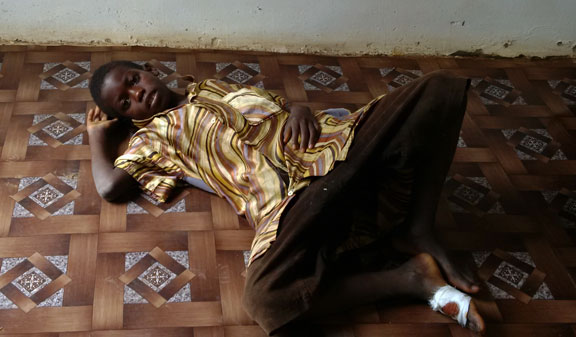
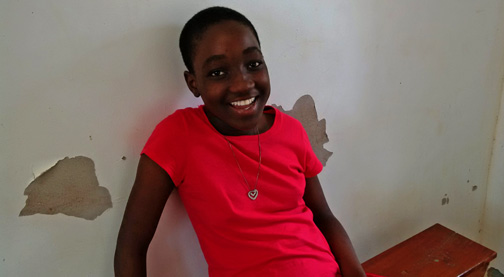 Jackie
is a very sensitive and attractive young woman. Jackie is one of
Hanneke’s ten children. Hanneke prefers to be called Bibi
(grandmother) although some kids insist on calling her Mom. Jackie has
experienced more than her share of difficulties in her fifteen years.
She is aware that she was abandoned by her birth family and that a
possible adoptive family has just withdrawn their application. She has
tearful moments but displays amazing resilience. She has become close
enough to Matt and me to tease us, calling us bad gringos. This morning
she asked if I ever went to the gym. I said maybe a long time ago.
“Well,” she said, “you don’t look like a gym person to me. You have too
much meat!”
Jackie
is a very sensitive and attractive young woman. Jackie is one of
Hanneke’s ten children. Hanneke prefers to be called Bibi
(grandmother) although some kids insist on calling her Mom. Jackie has
experienced more than her share of difficulties in her fifteen years.
She is aware that she was abandoned by her birth family and that a
possible adoptive family has just withdrawn their application. She has
tearful moments but displays amazing resilience. She has become close
enough to Matt and me to tease us, calling us bad gringos. This morning
she asked if I ever went to the gym. I said maybe a long time ago.
“Well,” she said, “you don’t look like a gym person to me. You have too
much meat!”
Today at the Manoleo clinic, while we worked on
the entrance door, the silhouette of a gaunt young boy appeared in the
open doorway. He had walked five miles carrying his ten-year-old son,
Maige, on his back. (Maige and his family live in Malumba, the village
where we have started the new medical outreach building). His brother,
slight for his years, was feverish and had a large boil on his foot. The
boy needed hospitalization. He was malnourished and likely had malaria.
The government medic gave him an aspirin, lanced his foot and wrapped it
in a few layers of gauze but he had no malaria medication in stock. The
boy lay on the cool clinic floor in agony, his sunken chest heaving with
every breath and blood oozing through his bandage. The white of his
beautiful eyes were taking on a greyish hue. Hanneke provided medication
for his malaria and an antibiotic against infection. She gave the father
careful instructions for their use.
While his father
was with Hanneke, Jackie tried to comfort the boy in so much pain. She
asked if she could pray for him. Her gentle Swahili voice prayed for her
new friend curled up at her knees. Her gentle crescendos betrayed her
emotions.
The stale smell of his feverish body became almost pleasant.
We drove the five miles to their home. The boy
sprawled across the seat. His father carried him up the path to their
home. Their humble dwelling was a red mud brick construction with an
aging thatched roof, so many miles from the closest help. As they faded
in the distance, obscured now by a mango tree, any confidence that the
young boy would recover was based solely on overhearing Jackie’s appeal
to her Father for little Maige.
David Livingstone
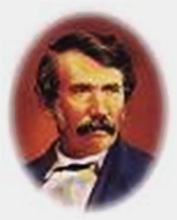
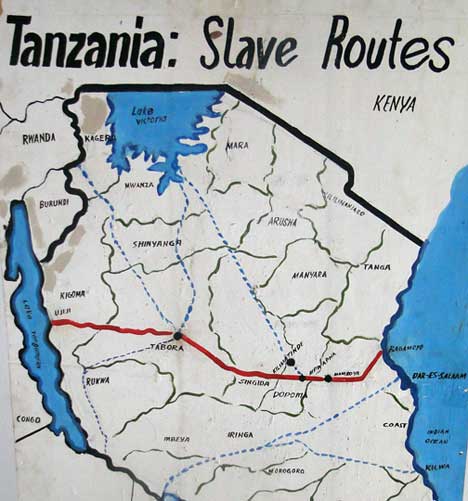 The
historic tembe (home) of David Livingstone stands on a gentle rise of ground
just ten kilometres outside Tabora city. Tabora region sprawls below with an
occasional new steel roof shimmering in the sub-Saharan sun. Our trip is a
pleasant twenty-minute pikipiki (motorcycle) ride. Livingstone, born in
Scotland in 1813 and buried in Zambia in1873, was a committed missionary,
explorer and anti-slave advocate.
The
historic tembe (home) of David Livingstone stands on a gentle rise of ground
just ten kilometres outside Tabora city. Tabora region sprawls below with an
occasional new steel roof shimmering in the sub-Saharan sun. Our trip is a
pleasant twenty-minute pikipiki (motorcycle) ride. Livingstone, born in
Scotland in 1813 and buried in Zambia in1873, was a committed missionary,
explorer and anti-slave advocate.
Arriving
at the Livingstone tembe, Mahona, Matt and I were welcomed by a
Tanzanian tourist guide. He spoke excellent English, sharing his
knowledge of Livingstone and his tembe with enthusiasm.
This
rambling mud brick structure was constructed by an Arab slave trader.
The owner offered accommodation to Livingstone, hoping he would help
secure a better route for his diabolic business. Livingstone refused.
The home served as a holding tank for slaves taken from Uganda and
western Tanzania. Tabora is located on the critical east-west route.
Today huge mango trees populate the area, often a result of seeds
dropped by slaves on their endless march. The facility can hold a
maximum of two hundred slaves. The slaves were then driven to the Indian
Ocean, over 900 kilometres away (two or three months) and barged to
Zanzibar Island, to be displayed in slave markets like livestock.
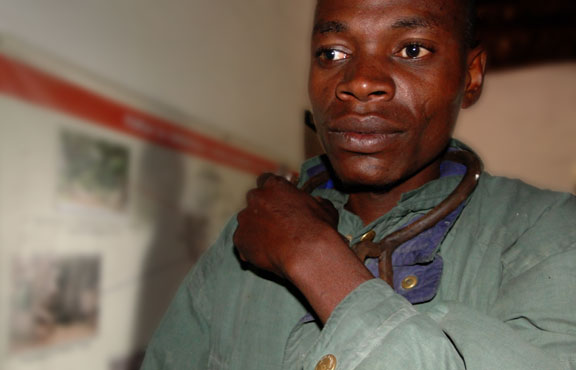 Livingstone
attempted to persuade his Arab host to give up his slave trade but he
refused, abandoning his tembe to Livingstone instead. Livingstone didn't
live in this home for long. He remains a world-celebrated medic, devout
missionary and an explorer who charted large areas of east Africa, while
seeking the source of the Nile River.
Livingstone
attempted to persuade his Arab host to give up his slave trade but he
refused, abandoning his tembe to Livingstone instead. Livingstone didn't
live in this home for long. He remains a world-celebrated medic, devout
missionary and an explorer who charted large areas of east Africa, while
seeking the source of the Nile River.
Display cases
contain articles, including a copy of the New York Herald—the newspaper
that funded Lord Stanley to travel to Tanzania to discover if
Livingstone were still alive. Rumours of his death had spread. Stanley
is credited with his famous quote on meeting Livingstone: “Dr.
Livingstone, I presume!” Livingstone died in Zambia shortly thereafter
of malaria, typhoid and internal bleeding.
Rusted shackles and yokes, clanking around our
necks, helped us understand firsthand the oppressiveness the slaves were
subjected to. Slaves were chained in pairs at all times. Any slave who
became ill or feigned illness would be hacked down in front of the
others as a grim example. Christian missionaries who began the early
Christian church in Tanzania often purchased the slaves in the Zanzibar
markets to offer them freedom.
The final holding room close to the market
above, with only air slots high in the walls, would have been unbearably
crowded and sweltering. The final test of stamina. A well-furnished
kitchen with a very competent resident cook ensured that the slaves were
well fed so that they would bring in extremely high bids.
After experiencing the oppressive chains and
heavy yokes around our necks, we rode back to town on the back of our
pikipikis, owned by totally free black Tanzanians. The fresh air blew in
our faces as we relived these dark years of African history, while we
thanked God for men like David Livingstone who gave their lives that
others might live free spiritually and physically.
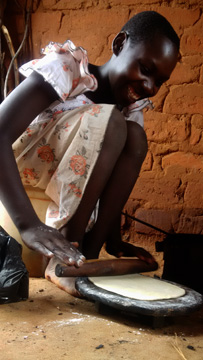 Mama
Tatu’s Chapati
Mama
Tatu’s Chapati
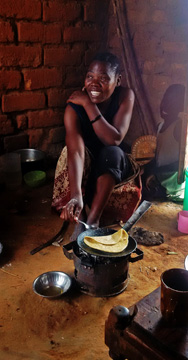
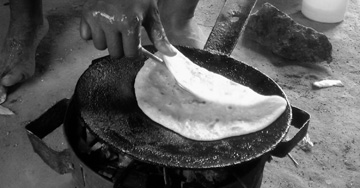
Today we feasted on the most delicious chapati
imaginable. The ambiance did enhance the taste. A small, mud brick hut
is situated across the road from the Manoleo clinic. Inside Mama Tatu’s
one-room restaurant, a charcoal fire glows in her cooking stove. Mama
and her two daughters are delighted to have customers from the
other-side-of-beyond location. They quickly begin mixing corn flour with
water,—first with a wooden spoon, then by hand, forming the dough into
smooth balls. A round stick is used to roll the ball flat. Mama Tatu
lightly oils her flat frying pan and places the dough on top. Soon big
bubbles form and she flips it over a couple of times, applies a little
oil on the outer edge and rubs inward with a spoon. She serves her
flatbread with salt and hot, sugary tea. Simple maybe, but Mama Tatu’s
chapati definitely is amazing. We teeter on two benches propped against
the wall as we appreciate our meal. The charcoal smoke tinges the room.
The interior is only illuminated by the open door and small window. We
bend low to exit Mama Tatu’s with her invitation to return. Our bill, a
meal for four with beverages, comes to approximately one dollar and no
tip is expected.
The Orphanage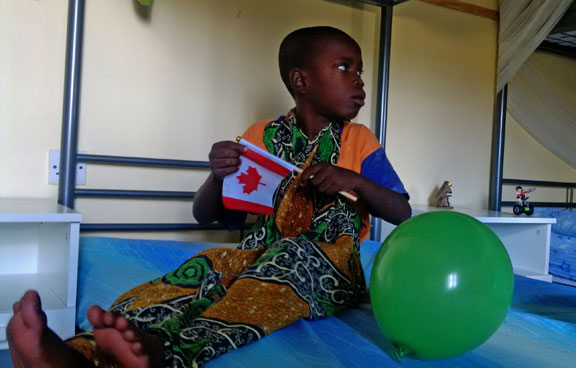
There are sixteen orphans under
ten years of age at the newly opened Catholic orphanage.
Plans are in order to increase the number of children in
the orphanage as soon as the new on-site school facility
is completed. Three sisters, all from Ethiopia, look
after the kids with love and understanding. Pictures of
Jesus hang on the walls, a reminder that Jesus is the
source of their love for these young lives.
We took balloons, Canadian
flags, bracelets, pens and a soccer ball from Canada.
The facilities are among the
nicest we have seen in all Tanzania—well set up and
extremely clean with private showers, spacious bedrooms
and more than enough play areas. The majority of the
children suffer from albinism. Because of that they
aren't allowed to leave the compound without adult
accompaniment. Attacks on young children with albinism
are a constant threat. Extremely young children are the
target of witch doctors for their clients. Both boys and
girls love kicking the ball around, squealing with
delight at every imaginary goal. Some boys were
recovering from minor surgery and confined to the
infirmary. Matt enjoyed helping assemble some of their
gifts. Even after our short time with the kids, it was
not easy to leave. We walk out through the heavy iron
gate. The children cannot be allowed such freedom. They
are captives because of the unique color of their skin.
Too much evil intent lurks in the minds of so many
people in this land which still remembers the scars of
the slave trade.
The weather is heating up—no
rain for the past three days. We hope that this is not
the end of the rainy season. The corn is as high as the
Serengeti elephant’s eye, tassels reaching right up to
the cloudless blue sky. If the rains stop, the corn will
wither and die. Roads turn from muddy mires to mirages
of dust clouds with red dust blanketing everything—the
type of dust that covers you and then gets into your
bed, under the covers and into your nose, dehydrating
your whole system.
Farewell Tabora

Tabora was refreshing, with
daily rains drenching the region. However, here in Dar
es Salaam, the Casablanca fan churning above provides
feeble relief from the oppressive noon-time heat. (The
electricity cut out two hours ago, and I feel ready to
be flipped like Mama Tatu’s bubbling chapati). Waves of
humidity blanket Tanzania's largest city, located on the
coast of the Indian Ocean. I pause in my self-pity and
remember the inhuman two-to-three month slave march
through Tabora to this very area and then on to the
weekly market in Zanzibar.
Recalling our months in Tabora conjures a touch of
homesickness. We remember Mfaume guiding us to the right
bus at 5:30 a.m. through inky blackness and drizzling
rain. Hugging this wonderful man made the ache of
leaving more tangible. Somehow it just didn't seem
right. Hadn’t we just arrived yesterday? We sped through
the darkness blurring the familiar landmarks we knew so
well.
Our last view of the Malumba
project was through cascading torrents from inside the
car. The security wall and clinic foundations are
complete. Although the amount of work we were physically
able to complete seemed meagre, we were able to
encourage the crew. The local experts continue with
construction. Now they can envision their clinic
offering a better life and purpose for their families in
the often-forgotten Malumba district, a much more
manageable walk for those in the district.
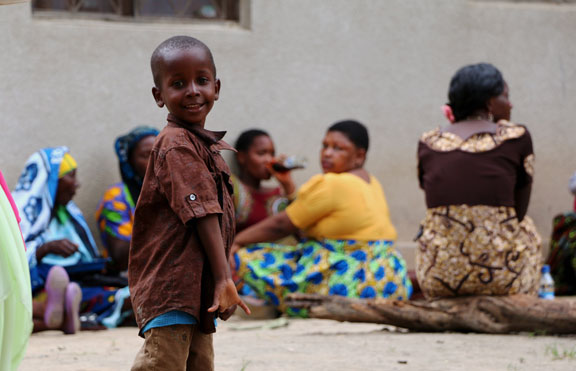
 One
haunting image returns of a young mother with her
handicapped four-year-old son strapped to her back. They
were on their daily, three-kilometre trek to work in her
rice field. He was born with a genetic defect and
although his muscles will never fully develop, he is
gaining weight. Her husband blamed her for her son's
defect and kicked her out of their home. She refuses to
remarry because she fears no one could value her child,
so she has given her life to care for her son. His life
expectancy is not long. Hardship is a part of everyday
life here in Tanzania. We watched her fade along the
red-earth path, their daily food supply balanced on her
head, hoe in hand and her helpless baby slung on her
back. This emphasized the urgency for the health project
in this area.
One
haunting image returns of a young mother with her
handicapped four-year-old son strapped to her back. They
were on their daily, three-kilometre trek to work in her
rice field. He was born with a genetic defect and
although his muscles will never fully develop, he is
gaining weight. Her husband blamed her for her son's
defect and kicked her out of their home. She refuses to
remarry because she fears no one could value her child,
so she has given her life to care for her son. His life
expectancy is not long. Hardship is a part of everyday
life here in Tanzania. We watched her fade along the
red-earth path, their daily food supply balanced on her
head, hoe in hand and her helpless baby slung on her
back. This emphasized the urgency for the health project
in this area.
We will miss Christopher, the
owner of the local soda shop. He had become our hot-day
friend. He kept his Coke and Pepsi varieties deliciously
cold in glass bottles and offered us seating on his
concrete front counter or in the VIP lounge out back on
wobbly plastic chairs under his laundry and the coconut
tree. We wondered if we would be there long enough to
experience a coconut fall from one hundred feet.
Although Matt was not a soda fanatic, the ritual and
friendship became as refreshing as the cheap pop.
Ironically, we will not miss the church services!
Beautiful African voices are amplified into distortion.
The ear-splitting volume is so foreign to us
mzungus
(white foreigners). On the
frequent occasions that the electricity cuts out, then
we actually enjoy the harmony. But all too soon the
generator is fired up and the monster speakers swallow
the beautiful voices. Often the preacher will be of
equal volume. This phenomenon causes us pain as we
slip each other ear plugs. Sister Magdalena has an
amazing resonant voice and we long to hear her, but alas
she is swallowed in distortion. The invasion of the mega
amps has become an issue here. We are donating our
earplugs to Hanneke for future guests.
The old Orion Railway Hotel
lives in an era when throngs of elegant passengers were
greeted in its lobby. They arrived from distant ports
and then traveled across the country to Tabora. The now
faded facade and drizzling fountain welcomed visitors to
the Tabora region for years. We took Baraka for “chips
mayday” (a French-fry omelette). He felt like a special
gentleman—although I am not sure that delicacy was on
the original menu in the Orion’s heyday. Most of the
sounds from the railway are now the shunting of cargo
cars, although the government has promised significant
spending on the rail infrastructure. So possibly
travellers may once again make the incredible journey in
comfort, crossing the Rift Valley through wildlife
reserves and past villages made alive by the vendors
selling fresh mangoes, honey and papayas. Maybe the
Orion may once again offer exotic local specialties.
Hanneke, Naomi (Hanneke’s house
helper of fifteen years), Mahona, Mfaume, Jackie, Kiri,
Baraka and Faraja were quieter as we left. Like the
early guests at the Orion, we leave feeling spoiled and
spiritually refreshed. A taste of heaven under the shade
of the mango trees close to the railway tracks and
always near the heart of God’s special people.
Uganda

Our single-engine Cessna sputtered to life.
Soon we are above the Ugandan expanse in our Mission Aviation Fellowship
flight out of suburban Entebbe. Red-brown arteries—dirt roads and
paths—intersect the green tapestry sprawls below. Villages remain hidden
from our altitude.

One and a half hours later we descend toward
a narrow mud strip. After touchdown we see Leah and several friends
sheltered from the heat. She is excited to see friends from Canada.
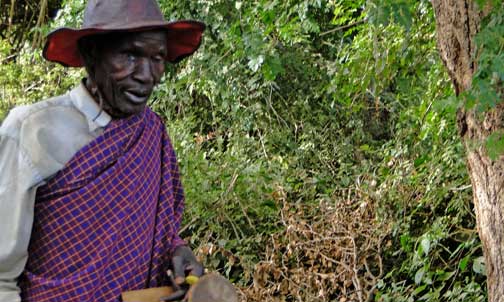
The Karimojong people are attempting
to put some distance from their violent past. Arguments over cows, land
or wives were resolved with smoking guns. The Ugandan government has
successfully reduced the gun obsession in most of the Karamoja region
and its people are beginning to feel safer. (Prisoners were sent to the
Karamoja area on work projects because the gun-toting men of this region
were so feared that the prisoners never attempted to escape.) They live
in spread outmostly in Bandas (mud huts with a thatched grass roof.
Small villages are often one extended family—a husband. his wives and
their children.
L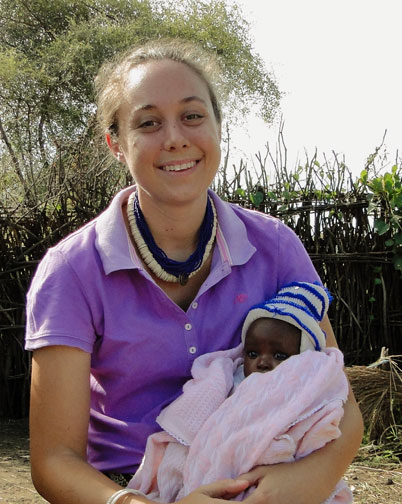 eah's
home is her Banda, a round brick hut with a thatched roof as well as a
separate kitchen Banda. Leah enjoys her life here and does not feel any
real hardship.
eah's
home is her Banda, a round brick hut with a thatched roof as well as a
separate kitchen Banda. Leah enjoys her life here and does not feel any
real hardship.
Her day begins with Bible study and a briefing
at the clinic. An aged man, wrapped in a typical red and blue checkered
Masai tribal blanket, uses his stick to make his way over the
treacherous landscape each day. His sightless gaze is fixed straight
ahead, but there is an expression of joy on his face as he sits bolt
upright in the middle of the group.
We struggle to keep up with Leah and her two
health care workers, Naduk and Lomuria, on our forty-five minute trek to
Kopetatum. The village is surrounded by a lethal hedge of thorn bushes
to keep intruders out. (At night another thorny clump is pulled into the
opening from inside to complete the security barrier). The women gather
when we arrive. We are invited to sit on the only smooth area available
(packed cow dung and mud) with the others. We are introduced to Lucia, a
blind grandmother, who stretches out her weathered hand and we exchange
blessings. She smiles a toothy smile and announces that I am welcome and
that my Karimojong name would be “Lokut,” since I came to visit them on
a breezy day. (Matt receives the name “Loyep” for one who cuts small
branches). The health care workers teach their basic sanitation and
disease control lessons. Then they answer questions and offer advice on
conditions that need improvement. Greetings and goodbyes to the
Karimojong are long and sincere, but we finally leave. Knowing that we
will never pass this way again, we savour the smells, sounds and voices.
On to the next thorn bush-surrounded village.
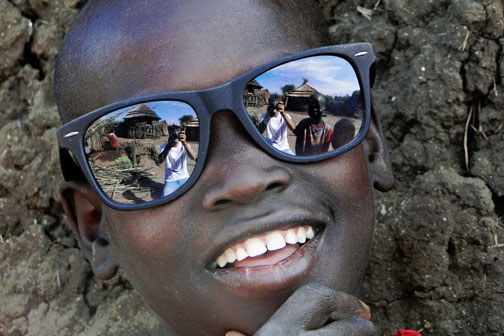 We
joined Leah’s evangelist, Simeon Peter, on his long walk in the
scorching sun, with only a gentle breeze. Trails crisscross, leading in
many directions. We wade barefoot through a muddy stream. Finally we
spot a few men under a tree and greet them. Soon, other men and boys
appear, as if by magic. Simeon begins with singing. The Karimojong men
spend much of their lives, just debating and sitting under trees while
the women do the hard work. This pattern has changed little over the
ages. The outdoor Bible class with the men is stimulating and many
interact with keen interest.
We
joined Leah’s evangelist, Simeon Peter, on his long walk in the
scorching sun, with only a gentle breeze. Trails crisscross, leading in
many directions. We wade barefoot through a muddy stream. Finally we
spot a few men under a tree and greet them. Soon, other men and boys
appear, as if by magic. Simeon begins with singing. The Karimojong men
spend much of their lives, just debating and sitting under trees while
the women do the hard work. This pattern has changed little over the
ages. The outdoor Bible class with the men is stimulating and many
interact with keen interest.
Leah’s home base is close to the mountain
range—an ancient volcano. We went for a long walk—made longer by the
number of people we had to stop and greet along the way. The people love
Leah and appreciate that she has invested much of her life to be with
them.
Back in Leah’s Banda she shows us where the
Black Mamba snake slithered in for a visit one day. She talks about her
hopes of seeing health and education become more vital and more churches
planted. She only mentions the two-inch thorn that penetrated her sandal
last week—part of the territory she has chosen. This is Leah's home and
these are her people—young and old. When the Karimojong greet her by
name, they do so with a discernible tone of love and gratitude.
 We
are suffering from our long gruelling flight on our journey into
Africa. Matt’s fiancée, Hayley, Mom and sister said goodbye at
Toronto Pearson. As we were jostled through security screening, I
left my laptop in my backpack for inspection. So I was ushered back
through the whole process. This time all went well. I quickly
grabbed my stuff and hustled on. Five minutes passed when I realized
I was about to lose my pants: “My belt,” I mused, "my wallet and
phone!" I returned a third time and everything was sitting in the
open, waiting for anyone to pick them up.
We
are suffering from our long gruelling flight on our journey into
Africa. Matt’s fiancée, Hayley, Mom and sister said goodbye at
Toronto Pearson. As we were jostled through security screening, I
left my laptop in my backpack for inspection. So I was ushered back
through the whole process. This time all went well. I quickly
grabbed my stuff and hustled on. Five minutes passed when I realized
I was about to lose my pants: “My belt,” I mused, "my wallet and
phone!" I returned a third time and everything was sitting in the
open, waiting for anyone to pick them up.














 The
security wall at the new Malumba health, education and evangelism centre
will enclose 20 x 25 metres. The main building, in the western end of
the enclosure will be 5 x 10 metres with two rooms and a covered
verandah which will serve as a classroom and waiting area. Two bathrooms
will be built at the opposite end of the enclosure. Moringa trees will
be planted inside the walls. Moringa is recognized for its health
benefits: from the dried leaves to the seeds contained in longish bean
pods dangling from their branches.
The
security wall at the new Malumba health, education and evangelism centre
will enclose 20 x 25 metres. The main building, in the western end of
the enclosure will be 5 x 10 metres with two rooms and a covered
verandah which will serve as a classroom and waiting area. Two bathrooms
will be built at the opposite end of the enclosure. Moringa trees will
be planted inside the walls. Moringa is recognized for its health
benefits: from the dried leaves to the seeds contained in longish bean
pods dangling from their branches. A
Mediterranean blue sky with pristine white clouds and the sweltering sun
beat down on the plot of land. The trenches have been prepared. So let
the construction begin! Some sparse clouds offer fleeting relief.
A
Mediterranean blue sky with pristine white clouds and the sweltering sun
beat down on the plot of land. The trenches have been prepared. So let
the construction begin! Some sparse clouds offer fleeting relief.
















 eah's
home is her Banda, a round brick hut with a thatched roof as well as a
separate kitchen Banda. Leah enjoys her life here and does not feel any
real hardship.
eah's
home is her Banda, a round brick hut with a thatched roof as well as a
separate kitchen Banda. Leah enjoys her life here and does not feel any
real hardship.